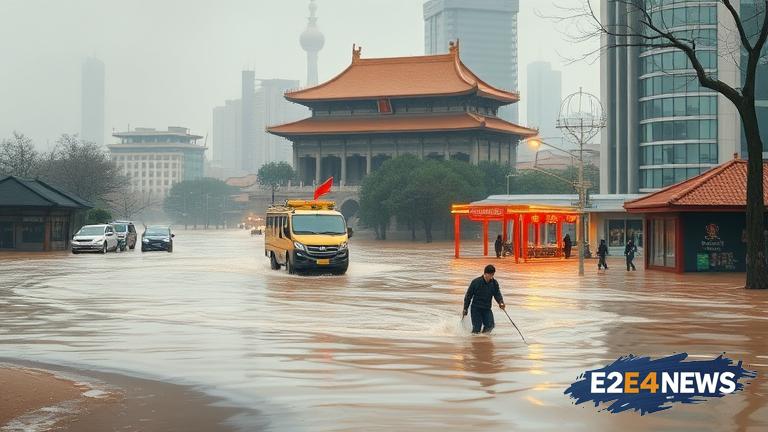A severe flood warning was issued in Beijing, China, after heavy rainfall caused widespread flooding, resulting in the evacuation of over 82,000 people. The Chinese government had issued a red alert, the highest level of warning, as the floods caused significant damage to infrastructure, homes, and businesses. The floods were triggered by a severe storm that brought heavy rainfall to the region, with some areas receiving over 100mm of rain in just a few hours. The rapid rise in water levels caught many residents off guard, with some being forced to evacuate their homes in the middle of the night. The Beijing government quickly responded to the crisis, deploying emergency services and rescue teams to affected areas. The city’s drainage system was overwhelmed, causing water to rise to dangerous levels in some areas. The floods also caused significant disruptions to transportation, with many roads and highways closed due to flooding. The Beijing Capital International Airport was also affected, with some flights delayed or canceled due to the weather conditions. The Chinese government has promised to provide support to those affected by the floods, including financial assistance and temporary housing. The city is working to restore normalcy, with crews working to clear debris and repair damaged infrastructure. The floods have also raised concerns about the city’s preparedness for extreme weather events, with some critics arguing that more needs to be done to prevent such disasters in the future. The Chinese government has announced plans to invest in flood prevention measures, including the construction of new drainage systems and flood walls. The floods have also had a significant impact on the local economy, with many businesses forced to close temporarily due to the flooding. The city’s agricultural sector has also been affected, with some crops damaged or destroyed by the floods. The Chinese government has promised to provide support to farmers and businesses affected by the floods. The floods have also raised concerns about the impact of climate change on extreme weather events, with some scientists arguing that such events are becoming more frequent and intense due to rising global temperatures. The Chinese government has announced plans to reduce the country’s carbon emissions and invest in renewable energy sources. The floods have also highlighted the need for better urban planning and infrastructure design, with some critics arguing that the city’s rapid urbanization has contributed to the severity of the flooding. The Beijing government has announced plans to review the city’s urban planning policies and invest in more sustainable and resilient infrastructure. The floods have also had a significant impact on the city’s residents, with many people forced to evacuate their homes and seek shelter elsewhere. The Chinese government has promised to provide support to those affected by the floods, including counseling and other forms of assistance. The city is working to restore normalcy, with crews working to clear debris and repair damaged infrastructure. The floods have also raised concerns about the city’s preparedness for extreme weather events, with some critics arguing that more needs to be done to prevent such disasters in the future.





